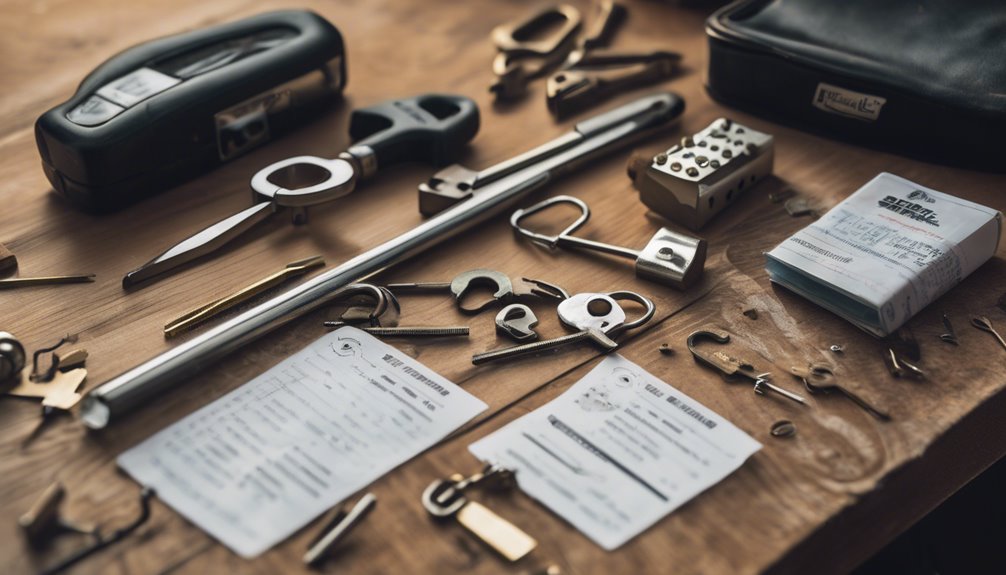Becoming a locksmith in Wisconsin is like opening a door to a rewarding career. You'll need to meet specific age and education requirements, but that's just the beginning. With the right training and certification, you can confidently navigate the path to your new profession. So, what steps do you need to take to guarantee you're fully prepared for this journey?
Key Takeaways
- Be at least 18 years old and possess a high school diploma or GED to qualify for locksmith training in Wisconsin.
- Complete a locksmith training program with a minimum of 200 hours, including 10 hours on Wisconsin laws and regulations.
- Obtain a locksmith certificate upon successful completion of the training program to demonstrate your qualifications.
- Pass the written licensing exam administered by the Wisconsin Department of Safety and Professional Services to legally provide locksmith services.
- Submit a completed application, proof of training, and exam results along with required fees to obtain your locksmith license.
Requirements to Become a Locksmith in Wisconsin

To become a locksmith in Wisconsin, you need to meet several key requirements. First, you must be at least 18 years old and hold a high school diploma or GED.
Next, you'll need to complete a locksmith training program that consists of a minimum of 200 hours, which includes at least 10 hours focused on Wisconsin laws and regulations relevant to locksmithing.
Complete a minimum of 200 hours in locksmith training, including 10 hours on Wisconsin laws and regulations.
While Wisconsin doesn't have specific licensing requirements for locksmiths, obtaining a locksmith certificate is essential as it showcases your training and competence in the field.
This certification also serves as proof of training when you take the licensing exam administered by the Wisconsin Department of Safety and Professional Services, testing your knowledge of locksmithing practices and regulations.
Training Program Details
After meeting the initial requirements to become a locksmith in Wisconsin, you'll need to engage in an extensive training program. This program consists of at least 200 hours of instruction, combining both theoretical and practical components. You'll spend a minimum of 10 hours focusing on Wisconsin laws and regulations. Completing a training program at a locksmith school prepares you for real-world situations, including key cutting, lock installation, and emergency bypass techniques.
| Training Component | Hours Required |
|---|---|
| Total Instruction | 200 |
| Wisconsin Laws and Regulations | 10 |
| Key Cutting | Varies |
| Lock Installation | Varies |
| Emergency Bypass Techniques | Varies |
Successful completion earns you a locksmith certificate, necessary for your next steps.
Licensing Exam Process

The licensing exam process for locksmiths in Wisconsin is a critical step that confirms you possess the necessary knowledge and skills to operate legally in the field.
Administered by the Wisconsin Department of Safety and Professional Services, the licensing exam tests your understanding of locksmithing practices and regulations. To qualify for the locksmith license application, you must pass this written exam, which assesses both theoretical knowledge and practical understanding.
Topics include lock installation, maintenance, and security standards. Successfully passing the licensing exam confirms that only qualified individuals can legally provide locksmith services, allowing you to confidently offer a range of locksmithing solutions.
Application for Locksmith License
Applying for a locksmith license in Wisconsin involves several important steps that guarantee you meet the necessary qualifications to operate legally.
First, you must pass the written exam administered by the Wisconsin Department of Safety and Professional Services, which tests your necessary knowledge of locksmithing practices and regulations.
Once you pass, you'll need to submit a completed application, proof of training, and exam results along with the required fees.
The application process also requires additional documentation, such as identification and a declaration of good moral character.
Authorized Locksmith Services

When you need reliable security solutions, authorized locksmith services in Wisconsin offer a range of essential options tailored to your needs.
As you explore becoming a locksmith, consider the valuable services provided by certified locksmiths, which include:
- Key cutting for duplicate keys
- Lock installation and repair for residential and commercial properties
- Emergency lockout services for quick access to your home or vehicle
- Master key systems for controlled access across multiple locks
- Biometric lock handling, enhancing security with fingerprint or facial recognition
Finding the Right Locksmith School and Training Options
When you're choosing a locksmith school in Wisconsin, it's essential to evaluate the quality of the training programs available.
While online courses offer flexibility, in-person training often provides better hands-on experience and skill development.
Don't forget to explore apprenticeship opportunities, as they can greatly enhance your learning and prepare you for real-world challenges.
Evaluating Training Program Quality
How can you guarantee that the locksmith training program you choose meets your needs and prepares you for a successful career? Evaluating training program quality is vital. Here are some key factors to take into account:
- Confirm a minimum of 200 hours of instruction covering both theory and practice.
- Look for programs that incorporate Wisconsin-specific laws and regulations.
- Research accredited institutions, like the Associated Locksmiths of America (ALOA).
- Prioritize in-person training for hands-on experience essential for a locksmith apprentice.
- Assess the curriculum to include key cutting, lock installation, and emergency bypass techniques.
Online vs. In-Person Training
Choosing between online and in-person locksmith training can greatly impact your future career.
Online courses, like those from Foley Belsaw and Penn Foster, offer flexibility, but they often lack the hands-on experience essential for becoming a skilled locksmith technician.
In-person training at places like Fox Valley Technical College provides 40 hours of intensive, practical experience and direct mentorship from experienced instructors, which can enhance your skill retention.
Many employers prefer candidates with in-person training, especially those certified in automotive locksmithing.
Additionally, certifications from the Associated Locksmiths of America (ALOA) are more widely recognized when obtained through structured programs.
Make certain to choose a training option that meets local licensing standards to verify your qualifications are valid.
Apprenticeship Opportunities Available
Finding the right apprenticeship is a fundamental step in your journey to becoming a locksmith. After completing your locksmith training program, you'll want hands-on experience under the guidance of an experienced locksmith.
Here are some tips to help you find the best apprenticeship opportunities:
- Reach out to your locksmith school for placement resources
- Network with professionals in the locksmith field
- Look for local businesses offering apprenticeship programs
- Verify the apprenticeship covers various locksmithing techniques
- Confirm the duration meets the required hours for competence
Engaging in an apprenticeship not only enhances your practical skills but also helps you build a professional network, paving the way for future job opportunities in locksmithing.
Take this step seriously; it's essential for your success!
Frequently Asked Questions
How Long Does It Take to Learn to Be a Locksmith?
It typically takes several months to a few years to learn locksmithing.
You'll start with at least 200 hours of training through courses, which can vary in length.
If you choose an apprenticeship, expect to spend 1 to 3 years gaining hands-on experience.
Online courses can offer flexibility, but in-person training usually gives you better skills.
Ultimately, your timeline will depend on the program and how quickly you learn the trade.
Do You Need a Permit to Be a Locksmith?
You don't need a permit to be a locksmith in most areas, but it's essential to check local regulations.
While state licensing isn't mandatory, having certifications can boost your job prospects and earning potential.
You might still need a business license to operate legally in your city or county.
Researching specific requirements in your area guarantees you're compliant and sets you up for success in your locksmithing career.
Is It Worth Training to Be a Locksmith?
Absolutely, training to be a locksmith is worth it!
You'll gain essential skills that can greatly boost your job opportunities. With hands-on experience from apprenticeships, you'll apply what you've learned in real-world situations, making you more employable.
Plus, while licensing isn't required, earning certifications can enhance your prospects and pay.
The locksmith profession offers a solid career path, so investing in training can lead to a rewarding future in this trade.
Do Locksmiths Make Good Money?
If you've ever thought locksmiths are only "locking up" their potential, think again!
Locksmiths can make good money, with annual salaries ranging from about $37,795 to $60,160.
If you're just starting out, you might earn around $5,013 a month, while experienced pros can rake in $1,158 a week.
Factors like location and experience play a big role, so honing your skills can really open doors to better pay and opportunities!









